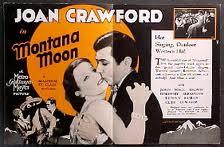
MONTANA MOON
US, 1930, 89 minutes, Black and white.
Joan Crawford, Johnny Mack Brown, Dorothy Sebastian, Ricardo Cortez, Benny Rubin, Cliff Edwards.
Directed by Malcolm St Clair.
Montana Moon is an early talkie, indicating that not all directors had adapted to the sound technology.
The film is a star vehicle Joan Crawford who had been appearing in number of MGM films and was soon to move into more serious roles and a more serious screen persona, winning an Oscar in 1945 for Mildred Pierce. Here she is a wealthy socialite, luring men, including a rather villainous Ricardo Cortez who professes his love for Joan’s sister, a sub-plot element that is not resolved by the end of the film. But, initially, to give her sister a free hand, she gets off a train and wanders from a town to discover a cowboy and his fire. He is played by former footballer, Johnny Mack Brown, who gives a fairly, sometimes intentional, stolid performance as a man who is captivated by Joan, suddenly marries her – which does strain the credibility for the audience – and she reveals who she is and take him home to her wealthy father for whom he works. The father is delighted that someone has tamed his erratic daughter.
Needless to say, like those many films where a bush girl goes to town and discovers evils in the city, this time he is the innocent with a group of over-wealthy, over-spoilt, young people who have too much time to party. He finds them hypocritical, clashes, fights, get into arguments with his wife and walks out and goes back to his life with the men who work the property. Amongst these is a character who has to do comedy, including the extracting of the tooth, with Benny Rubin, who plays a wandering, rather camp-style doctor – the comedy routines are fairly corny.
There is a lot of pre-Code sexual innuendo, a very flirtatious Joan Crawford with quite a number of innuendo lines, made all the more forceful by the sometimes dumb, sometimes knowing response of Johnny Mack Brown.
The director, Malcolm St Clair, worked with Max Sennett and made quite a number of low-budget films but then worked extensively on television during the 1950s and 1960s.
Something of a museum piece from MGM.